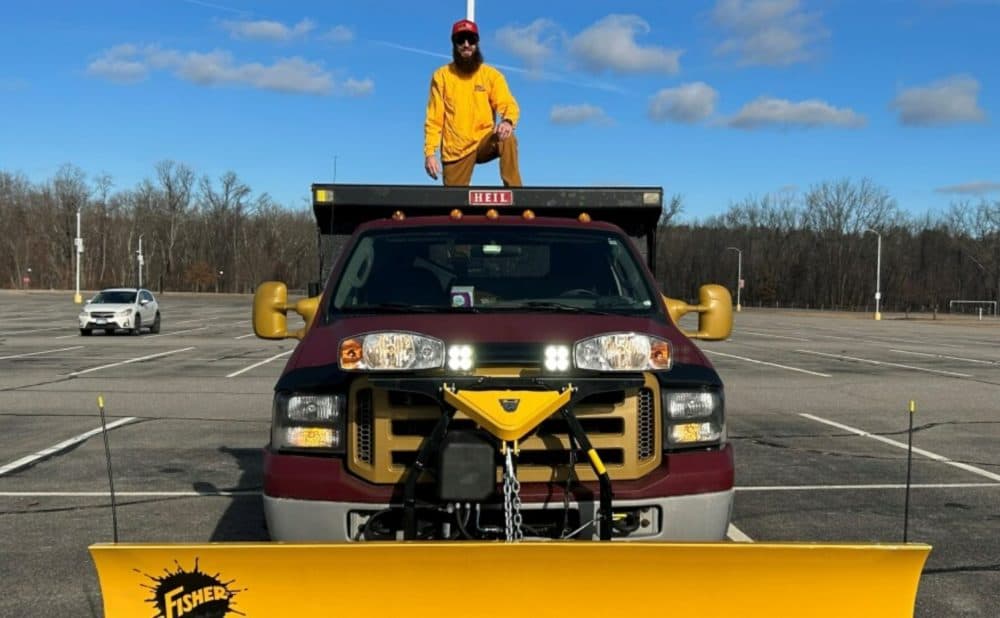Advertisement
‘You can’t plow a puddle’: How warmer winters are changing snowplowing

This winter, Harold Davis decided to get into the snow plow business for himself, after about a decade of working for other removal companies. He bought a shiny, canary yellow snowplow a few months ago. It’s still pretty spotless.
“It's depressing. This time of the season, there should be snow banks,” he said, looking out at bare driveways in early January. In Concord, where Davis lives, it’s been warm and rainy, with just a few days of snow.
As the climate changes, winter is the fastest-warming season for much of the United States, and New England is a hot spot. This year is no exception. As things warm up, Davis says snow plow businesses are feeling the impacts.
In the summer, Davis and his team reseal driveways, fill cracks in the road, and paint stripes onto parking lots. In the winter, he relies on plowing snow to make money. At the start of the season, he gathered up customers, and said he’d take care of their driveways when it snows more than three inches.
Then, in December, the first storm came.
“I was out there, every snowflake, with my tape measure in the snow, like, ‘Oh, we're at an inch and a half. It's almost time to go out!’” he said. “It just felt really good when I dropped the plow for the first time.”
The snow storms since then haven’t been big enough for Davis to plow his entire route for his 20 customers. He wants to pay someone to ride along and shovel for him, but right now, he can’t guarantee them steady work.
“I'm really still racking my mind about what else can I do to obviously keep my employees employed and to, you know, keep my family supported throughout the wintertime instead of just trying to save money in the summertime for the wintertime,” he said.
Davis charges per visit. If it snows a foot, he can make a few thousand dollars. He says it’ll take about four snowstorms to see a return on his investment in the plow, and another five storms for the truck. But for much of the winter, it’s been raining instead of snowing.
“You can't plow a puddle,” he said. “No one wants you to go plow a puddle.”
As climate change warms up winter, puddles are increasingly common. Mary Stampone, New Hampshire’s state climatologist, says there are more and more days when it’s not cold enough to snow.
“With the warmer temperatures comes a change in the type of precipitation, where we have more precipitation falling as rain during the winter season,” she said.
That doesn’t mean snow won’t fall. And when snowstorms do happen, they’re getting more intense, says Astrid Caldas, a climate scientist focused on community resilience at the Union of Concerned Scientists. That’s because warm air can hold more moisture.
“A lot of people, when they have these huge snowstorms, they say, 'How can it be global warming?'” she said. “Well, that's exactly what's expected under global warming, because there is more water vapor in the air to come down as rain or snow.”
Even with heavy storms, without consistently cold temperatures the snow is likely to melt, Caldas said.
“It’s not going to contribute to the snowpack, and many places depend on snowpack for a variety of water uses,” she said.
Concord, where Davis lives, has already lost about a week of snow cover in the last 50 years, according to the state’s latest climate assessment. By mid-century, the area could lose more than a month of snow cover, if we continue burning fossil fuels as usual. A reduction in greenhouse gas emissions could reduce the loss of snow, according to the report.
New Hampshire’s Department of Transportation says it’s been kind of a relief to have less snow this season; they have a lot of open positions, and rely on volunteers from other parts of the agency to help plow state roads when there’s a storm.
But as New Hampshire’s winters get warmer, Davis says smaller snow plow businesses are struggling.
“I think it's already clear to people that you can't count on snow plowing, like you can't,” he said. “It's been clear for a few seasons now."
Davis worries about climate change. He doesn’t want to see winter disappear, not just because it affects his business, but also because he loves snowboarding. He wants to share that experience with future generations.
“Not just my son, but his kids should be learning how to snowboard and have fun in the winters and not be like, ‘Oh, well, when my grandfather was around they actually snowboarded that mountain,’” he said. “That's a sad thought to think about.”
Even if storms are less frequent, Davis says he’ll still keep his equipment. He wants to be able to help people out who get snowed in, especially people who need to get out for emergencies, or can’t shovel themselves. Plus, he says, a plow truck is a pretty nice place to be, during a storm.
“The views you get, being out there before sunrise and watching the sun rise over all the trees covered in snow, and the way that the sun glistens off of it,” he said, “it's just beautiful.”
For now, he says, he’s just praying for snow.
This story is a production of the New England News Collaborative. It was originally published by New Hampshire Public Radio.